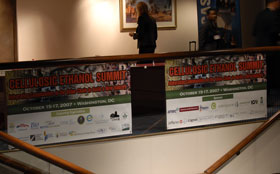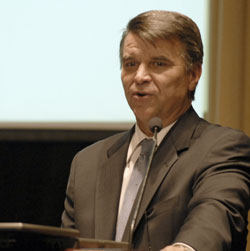 One of the people I met with here at the Cellulosic Ethanol Summit is Tim Lust, CEO of the National Sorghum Producers. Tim provided me with a historical perspective on how sorghum has been involved in ethanol production. For example, he says that the first ethanol plant to use sorghum in the production of ethanol was in New Mexico 20 years ago.
One of the people I met with here at the Cellulosic Ethanol Summit is Tim Lust, CEO of the National Sorghum Producers. Tim provided me with a historical perspective on how sorghum has been involved in ethanol production. For example, he says that the first ethanol plant to use sorghum in the production of ethanol was in New Mexico 20 years ago.
Tim says that about 60 percent of the crop grown next year will be within about 50 miles of an ethanol plant and they’re very excited about the future of ethanol production for the industry. He says they expect that 25 to 30 percent of next year’s crop will be used for ethanol production.
I asked him about the legislative work they’re doing here in DC and where things stand with an energy bill. He says that we’ve got a very non-traditional situation in terms of creating legislation but that’s it’s not necessarily a bad thing and that he’s optimistic there will be an energy bill. He also hopes that people attending the conference here will be excited about the opportunities being presented by cellulosic ethanol production but that they don’t forget who brought them to the dance. That would be grains.
You can listen to my interview with Tim here: [audio:http://www.zimmcomm.biz/ethanol/cellulosic-summit-07-lust.mp3]


 The
The 
 A Czechoslovakian-made jet has made history when it became the first jet to fly on 100 percent biodiesel. The L-29 military aircraft flew over the high desert near Reno, Nevada piloted by C.
A Czechoslovakian-made jet has made history when it became the first jet to fly on 100 percent biodiesel. The L-29 military aircraft flew over the high desert near Reno, Nevada piloted by C. The
The 
 Greg Blencoe, the CEO of Hydrogen Discoveries, Inc., an alternative energy research and development start-up company based in Oak Ridge, Tennessee, has issued a challenge to hydrogen energy skeptic Joseph Romm to debate the merits of hydrogen power.
Greg Blencoe, the CEO of Hydrogen Discoveries, Inc., an alternative energy research and development start-up company based in Oak Ridge, Tennessee, has issued a challenge to hydrogen energy skeptic Joseph Romm to debate the merits of hydrogen power. The
The  The
The  An interactive
An interactive